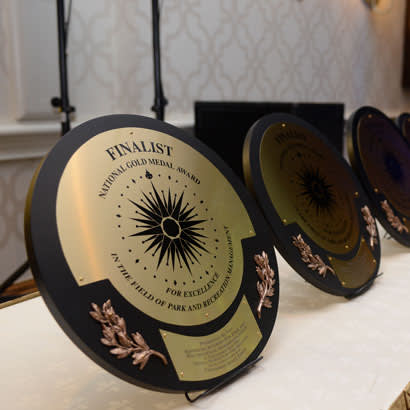
There are approximately 8,000 park and recreation agencies representing thousands of communities across the United States, but most of them do not apply for the Gold Medal Award program, governed by the American Academy for Park and Recreation Administration (AAPRA). Some believe they do not have a chance to win, others believe it too hard to apply and still others do not see a return on the resources invested if they do not win. To understand the benefits of applying for the Gold Medal, particularly for agencies that do not win, we interviewed representatives from agencies that were finalists but were not Grand Award winners.
Where It All Began
The Gold Medal Award (GMA) program dates to 1965, the same year that the program’s principal advocate, the National Recreation and Park Association (NRPA) was founded. The relationship continued until 2003 when oversight of the program was assumed by the AAPRA, which believes that awards create motivation to be the best and the GMA program helps it meet this goal. The award was established by the National Sporting Goods Association (NSGA) and its Sports Foundation, Inc., as a means to promote the participation of individuals in sports and recreation activities through the recognition of the country’s best park and recreation agency programs.
The GMA program has five classifications divided by population size: Class I through Class V. In 2005, the first award for state parks was given, followed, in 2013, by the first Armed Forces Award, bringing the GMA categories to a total of seven.
- Class I - more than 400,000
- Class II - 150,001-400,000
- Class III - 75,001-150,000
- Class IV - 30,001-75,000
- Class V - under 30,000
- State Parks
- Armed Forces
The GMA Study
Twenty-five communities were asked to participate in this study: three from each community class size and three from the Armed Forces. Each had been selected as a finalist in the past three years but had not been awarded the Gold Medal. Of the 25 asked, 10 community park and recreation departments participated — two from Class I, two from Class II, three from Class III, three from Class IV, one from Class V, and none from the Armed Forces — a response rate of 40 percent.
Responses
Survey participants were asked about the number of times they had applied for the Gold Medal. Most had applied at least five times, but one had applied every year since the inception of the program (meaning that agency had applied more than 50 times) and had yet to win the award, and one Class V community had applied twice.
Motivation to apply — For some, the motivation was to show off their agencies and their great accomplishments. They really believed they were good enough to win, with one Class V community stating: “We’ve got an amazing system and an amazing community, and I think it is Gold Medal worthy.” Another shared: “We felt like we had made it to a place where we could be competitive with other quality agencies.”
Other reasons for applying included boosting the staff and recognizing employees for their hard work and showing their commitment to maintaining and providing accessible recreation opportunities for the community. Several communities said it helped them set goals and compare where they were in regard to other cities, while some said it had to do with benefits for the community if they won. They believed that being in the limelight would help “sell the department to top management and elected officials and then by being recognized, it’s a huge marketing tool that we can help sell to our citizens and community.”
Benefits of applying — All the communities saw significant benefits from applying for the GMA program. “It allowed us to complete the internal review of our system that further enhanced our professionalism and commitment…it validated our organization’s excellence in park and recreation management,” one department shared. “The biggest internal benefit has been seeing staff work together better, because we are working toward a shared vision for wanting to be the best we can be as a park district family.” Two communities were even able to get a tax passed in an anti-tax environment.
Advice to Potential Applicants
Almost all the respondents would encourage agencies to “do it” or “give it a shot.” They cautioned that the application process cannot be done in a few weeks, and, initially, it may take more than a year to improve your department to Gold Medal status. Before applying, they suggest discussing what it will take with others who have applied. Other advice offered included:
- Talking with directors of winning agencies to learn as much as possible about their process before talking with your own staff.
- Making the application process a team effort. Get staff inspired by showing them videos from winning agencies, and hold brainstorming sessions, where they can honestly evaluate their programs and facilities and come up with solutions for improvement.
- Creating a timeline with measurable milestones to get the agency ready to compete with the best in our business.
- Having the staff point of contact for the application attend the Gold Medal Sessions at NRPA conference.
- Considering gaining agency accreditation. Accreditation helps improve the agency when the standards are met
It may take years to achieve a Gold Medal Award, but use the feedback to improve your organization. This objective critique can provide fresh and innovative ideas that can create compounded benefits. A critique can lead to an idea that leads to a new program, service, etc., which creates new customers and increases customer satisfaction. This, in turn, can help make you a stronger candidate for the Gold Medal Award next year. Not everyone can win but, certainly, all who participate seem to agree it is well worth the time and energy.
Merry Moiseichik is a Professor at the University of Arkansas. Carolyn McKnight is Superintendent for the Park and Recreation Commission of East Baton Rouge, Louisiana.

